 |
|
 |
2011
April
28-30
|
Calamity
Our prayers are with the victims of the largest tornado outbreak in U.S. history,
which was last night (April 27).
Athens and Atlanta were spared. We had a tornado warning around 1 a.m. and I stayed up
to monitor the situation. The storm was approaching us from the southwest and
eventually passed us to the south; I've heard an unconfirmed
report that there was indeed a tornado in Madison, Georgia.
Permanent link to this entry
Why people need credit cards
Look at all the unclarity and
confusion about overdraft protection on checking accounts.
If you have a debit card, there's always the risk that, without your anticipating it, your
account will be empty (whether on purpose or through fraud or error), and then where will you be?
Unlike your wallet, your debit card can be emptied in your absence. You can't be sure that while
it's in your pocket, its balance won't change.
What do I learn from this?
You can't get away from the need for credit.
Far from being an evil thing dispensed only by loan sharks,
"credit" simply means "trust" and is essential for everyday finance.
I don't mean you should be charging today's groceries to an account you have no realistic
plans ever to pay off! What I mean is that debit cards as we know them are too brittle
to be entirely practical.
The trouble with a debit card is that it depends on the moment-by-moment status of a bank account,
not on your ability to pay what you owe.
I use credit cards and pay them off every month. The point is, during that month, the card
issuer trusts me — I don't have to cough up every dollar instantly or after a short,
unpredictable delay. If there's any confusion or error, there's time to clear it up.
Go back 100 years and you'll find that credit — that is, trust — is what makes
business transactions possible. Nobody can be totally sure of the status of everything
at every instant; that's why credit is needed.
A debit card without overdraft protection is totally devoid
of credit, and that's the problem.
Spring semester is ending, and
everybody is trying to schedule everything for the last two days of classes, so I'll
close out April now. I'll see you in May!
Permanent link to this entry


|
2011
April
27
|
Google Chrome ignores cache control
One of the mysteries of the Web, or possibly just a software bug...
There seems to be no way to guarantee that Google Chrome will immediately
pick up changes to a newly edited web page. And yet it often does pick them up
immediately. At other times it refuses to do so.
Currently, the instructions on this web page are:
<meta http-equiv="Cache-Control" content="no-store, no-cache, must-revalidate" />
<meta http-equiv="Pragma" content="no-store, no-cache" />
<meta http-equiv="Expires" content="0" />
and yet it still caches the page (as you can see by typing about:cache in place of a URL).
Can anybody shed any light on this?
It is apparently a known limitation of Chromium (Chrome)
which has gone neglected for a couple of years or more.
Permanent link to this entry


|
2011
April
26
|
News flash: Money is our medium of exchange
What else is new?
"Students
say money influences everything from what
school they attend and what career they pursue to how quickly
they complete their degrees — or whether they graduate at all"
(Associated Press).
This is news? Money is how we make trade-offs in our society. Of course "money influences everything."
It's our means of economic communication.
You might as well complain that "writing influences everything" because written records and communications
are how we do business, so all the evil in the world must be the fault of writing.
Does the reporter want a world without money, where people are not free to make their own choices and trade-offs?
The story is accompanied by a picture of people protesting University of California budget cuts.
But the point of the protest is entirely different — not that money is bad, but that
the state appears to be failing to keep promises and failing to act in its own best interest.
Permanent link to this entry


|
2011
April
25
|
Financial tidbit
Here
is confirmation
of something I suspected:
Carrying a balance on a credit card will not improve your credit score.
FICO knows what your balance is on a particular date. FICO does not know whether or not you've
been paying it in full every month.
Permanent link to this entry


|
2011
April
24
|
Feast Day of the Resurrection of Our Lord

He was crucified for us under Pontius Pilate,
died, and was buried,
and was resurrected on the third day, according to the Scriptures,
and ascended into Heaven, and sits at the right hand of the Father,
and will come again in glory...
Permanent link to this entry


|
2011
April
22-23
(Extra)
|
(X)HTML makeover
I have fixed some problems with the DOCTYPE declaration for this page
(which had gotten messed up by inconsistent hand-editing), and as a side effect,
Google Chrome is no longer ignoring the cache-control instructions.
[But it seems that "no-store" is the only instruction
potent enough to ensure that Chrome reloads the page every time; "must-revalidate"
won't do it. I'm not entirely sure what is going on with Chrome.]
You're looking at genuine though sloppy XHTML 1 Transitional, which is as mongrel
a language as ever walked the earth. (Do you like mixed metaphors?)
These changes will not be made retroactively on past Notebook pages.
HTML language lawyers please note: I am knowingly omitting the supposedly required "alt"
attribute on some images. Also, there are some external URLs here that are
genuinely correct but are misread by the W3C validator.
Permanent link to this entry


|
2011
April
22-23
|
Short notes
I wish all of you a blessed Good Friday and Easter weekend.
Want to know who is stealing your pictures?
Try TinEye Reverse Image Search.
Upload a picture to it, or give it the URL of an image that is already on the Web.
It will find copies of the same image on the Web, even if they've been resized or
slightly defaced.
A word to the wise: It is illegal, not just rude but actually illegal,
to copy other people's pictures from the Web and republish
them without permission.
You have the same responsibilities publishing a web page that you would have
if you were printing a newspaper.
And I have ways of booby-trapping the pictures...
Permanent link to this entry


|
2011
April
21
|
How to ensure that a displayed web page is always up to date
Following up yesterday's minor technical triumph, today, with all browsers, you should
see the latest version of this page the first time you try. This is due to the command
<meta http-equiv="cache-control" content="must-revalidate">
in the <head> section of the page.
For a while I accidentally had it before <head>, and some browsers were ignoring it.
But there was another problem too. Following older practice, I had it set to say
<meta http-equiv="cache-control" content="no-cache"> <!-- wrong -->
which, for surprising and subtle reasons, does not actually mean "don't store this in the cache,"
at least not in some browsers. Details here.
The correct cache-control directive turns out to be "must-revalidate", which means "compare this to
what's on the server before using a cached copy." Another useful one is "no-store", which means "do not cache
this at all" and would be used for a web page with confidential data on it.
Addendum: At present, I am having trouble confirming that any of these
is entirely reliable with Google Chrome. (But that may have been due to a problem with DOCTYPE which
I am in the process of fixing.)
Permanent link to this entry


|
2011
April
20
|
Short notes
If you have been having to press Refresh to see the current version of this page —
maybe you won't have that problem any more. I thank Rob Caskey for pointing out an HTML error:
the META tags were outside the HEAD, as a result of some clumsy editing a long time back.
Correcting that seems to have fixed it, at least for some browsers.
My 2004 entry on how to publish your own book has
been updated and an advertiser (whom I was about to recommend anyway)
has even bought an ad there. I'm gratified to see the Daily Notebook working as a notebook,
not just as a news bulletin — it is an archive of information of lasting value.
If you have an Asus Eee, get the latest BIOS revision.
(For mine, it's dated 2/2010 but I didn't have it in October 2010; I think it was released after that.)
It gives you even more brightness levels. At last, freedom from dimness!
I think broadcast and cable TV are almost dead, because once you have the Internet, you don't need
another cable to deliver something else. Melody and I cut off cable last year and simply
chose to do without TV. Today we got a Roku box to stream TV
and audio from the Internet.
Setup was surprisingly easy. It found our wireless network and has us enter the security key through
its remote control.
The choice of standard American TV
programming is fairly meager unless you subscribe to Netflix (which we do) and/or Hulu
(which we're considering) or purchase streaming video through Amazon (easy, and built in).
But if you like exotic programming, there's plenty, including
newscasts from Germany and India. There's also an old-movie channel that is free.
Things like NASA TV are there, of course, and Weather Underground.
Then there's the music. It was easy to link my Pandora account
(free) to the Roku box, and we then spent the evening listening to classical music.
I'd prefer a box that accepts arbitrary URLs, which this one doesn't. In a year or two, this one may
be obsolete. But in the meantime, it cost the same as two months of cable TV, with no further monthly fee,
and it's well worth the
low price. And I don't have to dodge the Real Housewives of Atlanta, who are neither real, nor house, nor wife.
I'm going to come back to the issue of Internet and wireless tracking. Granted that we
know how the technology works, there are some things being done that would still strike almost
anyone as improper. Not seriously damaging in my case, but bothersome. More to come.
Permanent link to this entry


|
2011
April
19
|
The Web has always been less private than you think
I've always known something other people don't seem to be aware of —
the World Wide Web is a two-way communication system, and always
has been.
It's not like watching TV.
When you watch TV, the TV station has no way to know whether you're tuned in.
It sends a signal through the air to anybody who cares to pick it up.
Even if a cable TV company provides your antenna for you, the TV station doesn't
know about it.
On the Web, your browser sends requests to a server, and the server knows what
it's sending back, and where it's sending it. You are not tuning in a signal
that is broadcast to everybody. You are requesting specific things.
This makes a difference in privacy. If you watch a TV show about Hitler, nobody
knows. If you read a web page about Hitler, the server that sent it to you knows
that you did so.
There is room for serious discussion about how this kind of
information should be used. Sometimes the server stores some of its own
records on your computer in the form of small files called "cookies."
These are how it keeps you logged on to Facebook between sessions, for example.
But even without cookies, the server knows what it has sent you.
I would like to see some civilized limits on what can be done with
this information — but, inherently, the information exists
because of the way the Web works.
A related point: Some people are paranoid about "personal information." I am,
of course, duly cautious. I don't give out bank account information or my Social
Security Number. But I see no reason to keep my age, profession, or even e-mail
address secret. And it doesn't bother me that Facebook's advertisers (which pay
for Facebook to be free of charge) have access to the information I put in my
Facebook profile — which is, after all, information I've chosen to display
to the public.
Some people want an almost impossible level of privacy. To them I say: Go sit in a
small room and watch TV; don't use the Internet or even the telephone.
But you have missed a basic fact about human society — if you are
unduly secretive, people will not trust you. There's safety in being known.
Permanent link to this entry


|
2011
April
18
|
Advertising policy
I occasionally get requests from people who want to put paid advertisements
in the Daily Notebook or on some of my hobby web pages. (You can see one
on my fountain pen page.)
A few of my pages have Google Ads, and you can of course advertise through Google.
If you want to advertise by paying me directly, here's what I insist on:
- The vendor must be one in which I myself have confidence, and which does not
compete against me or my consulting clients, and the contents of the ad and the
choice of page on which the ad is
to be placed must be, in my sole judgment, appropriate.
- The ad consists of an image or text box hosted on my own site, delivered
in finished form by the advertiser, containing a link to the advertiser's site.
It must not contain scripting or animation and
must not be designed to deceive people or search
engines in any way. The ad must contain the name of the advertiser.
- Ads must be clearly distinct from material written by me. That is,
you cannot pay me to say things or put links in the text of the Notebook
or other material that is presented as my own words.
When you read my web site, you're seeing my own opinions, not someone else's.
The criterion is that if the reader can't tell it's a paid advertisement,
it can't be a paid advertisement. It's that simple.
I do not do paid endorsements or recommendations.
(It often happens that the vendor is someone I was already recommending or
inclined to recommend. These recommendations are things I do on my own initiative,
and the advertiser does not supply or control the wording or the links within it.)
- I can place ads on a year-by-year basis but prefer to place them "indefinitely,"
which means the ad will stay up at least two years and probably much longer,
until I have other reasons to revise the site.
- Notwithstanding the previous item, any ad will be taken down if it contains a
link to malware or to a site substantially different than I was led to believe,
or if it becomes
clearly obsolete or misleading.
- The hit counters displayed on some of my pages are not kept accurate
and should not be a basis for deciding where to advertise.
Advertising is not a major source of income for me, and I'm content to keep it
that way. Most requests to advertise on this site are turned down.
Finally, I do not do "link exchanges" and do not "want more traffic."
I will not put irrelevant material on my web pages just because someone
wants me to.
Permanent link to this entry


|
2011
April
17
|
How I took that moon picture
A walkthrough of video astronomy, or,
What RegiStax is all about
The moon picture that I posted in the previous entry has generated some interest.
Other people with 8-inch telescopes and similar cameras aren't getting pictures that
are nearly as sharp. So what's my secret?
Today I'll take you through the process that I used.
I used an 8-inch Meade telescope (with older-style, not ACF optics)
and a 640×480-pixel monochrome video camera from
ImagingSource.
In this case it had an infrared filter on it so that I was only
recording infrared light.
Also, the setup included a diagonal mirror, so the view is mirror-imaged
(flipped right to left).
At a frame rate of 1/30 second and an exposure of something like 1/100 second,
I recorded 2840 frames of video. That took about a minute and a half and generated
a file nearly a gigabyte in size.
Here is one frame of the video:
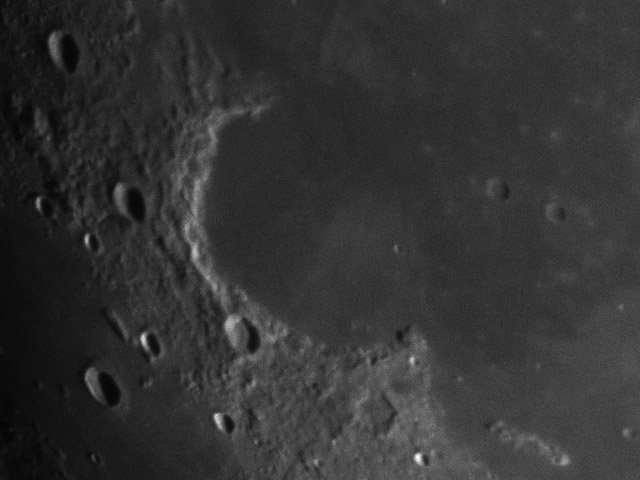
You can see a few seconds of the video
in motion if you click here.
Depending on your bandwidth, you may have to right-click, save the file, and then view it.
The whole thing is way too big to put on the Web.
What's going on? The image is moving around! The vertical drift is due to the orbital
motion of the moon; there was also a horizontal drift, but the telescope corrected it by
tracking at lunar rate. More importantly, there was constant turbulence from the
unsteady air.
So I put my video file into RegiStax for
processing.
In fact, today I processed it again in order to generate these examples to show you.
This happened to be my first session with RegiStax 6, which is new, and, I'm glad
to report, easier to use than earlier versions. More importantly, RegiStax 6 uses all available
CPU cores, so I was able to set it going on my 4-core machine and do in five minutes what had
formerly taken twenty.
The first step is for RegiStax to select alignment points. It can select them automatically.
Because the air turbulence makes the images stretch and shrink as well as moving around,
multiple points are needed. Here's what RegiStax used:
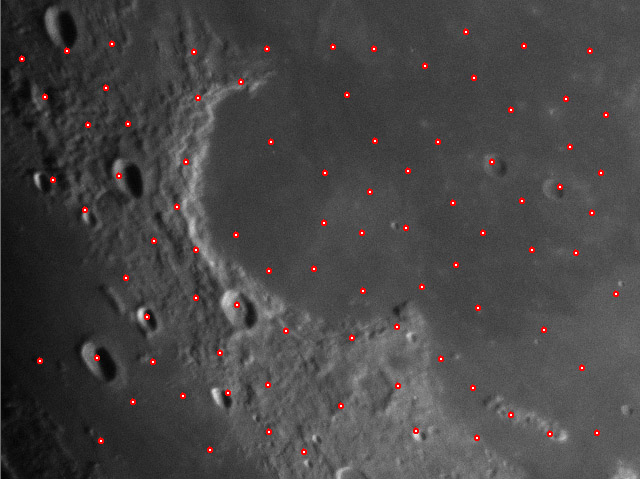
Registax then aligned all 2840 frames with each other, stretching as needed, and sorted them
by sharpness. I told it to stack the sharpest 2000 frames. Here's the result:
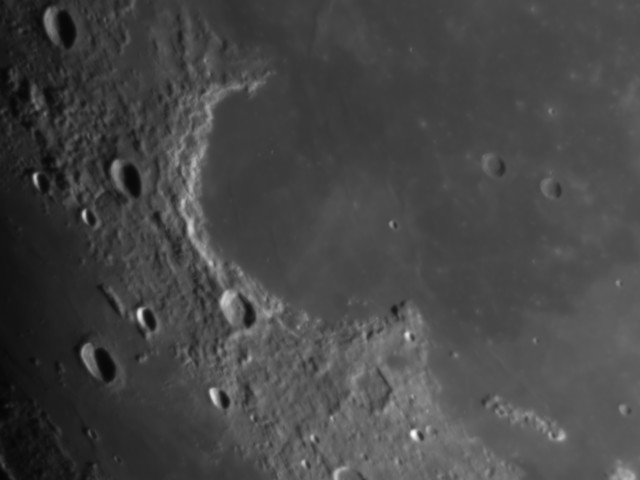
Compared to the first frame I showed you, this one has two advantages.
The obvious advantage is that there is no grain.
But there's a much more subtle advantage, too...
In the original frames, the blur was random.
Any point could be displaced anywhere.
But in the sum of thousands of randomly blurred images,
the blur is perfectly Gaussian, which means the horizontal and
vertical displacements follow a bell-curve distribution.
And Gaussian blur is something we know how to undo.
If we know exactly how the points in the image were spread out, we can put them back together!
Signal processing to the rescue...
In this case, RegiStax will use wavelet transforms
to let me selectively enhance fine detail.
What I have to do is figure out the size of the Gaussian blur;
that is the only unknown parameter.
(Actually, if it's symmetrical but not perfectly Gaussian, I can compensate for that too.)
RegiStax gives me sliders for various blur diameters.
I decide to do a lot of enhancement of 1-pixel detail and some enhancement
at the 2- and 3-pixel scales:
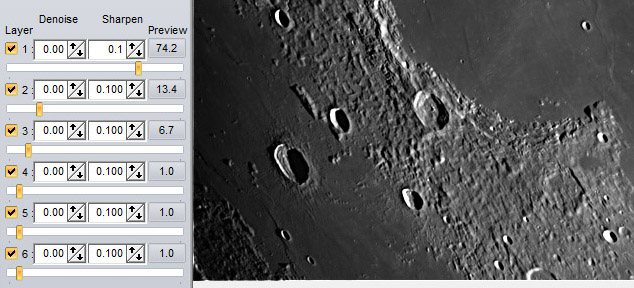
After applying the wavelet transform, I save the image and open it in Photoshop.
In Photoshop I adjust brightness and contrast (mainly to lighten the midtones),
flip the mirror image (to make up for the diagonal mirror), and
crop the image (to eliminate some lower-quality areas at the edges).
Here's the finished product:
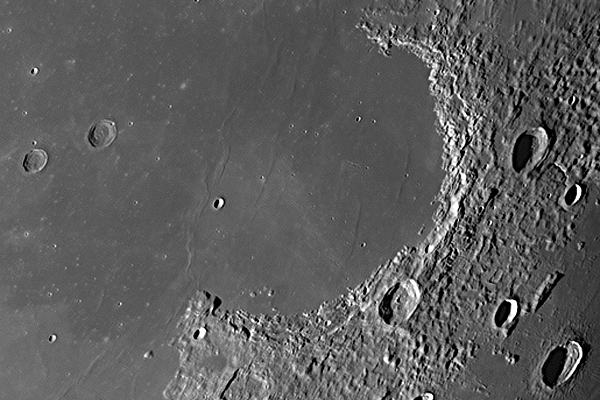
Almost magical, isn't it?
Addendum:
And here's an even better one. This is another exposure, comprising 2337 frames,
all of which were stacked. The telescope tracked better, and the sharpness near the
edges is better. Processed with RegiStax 6.
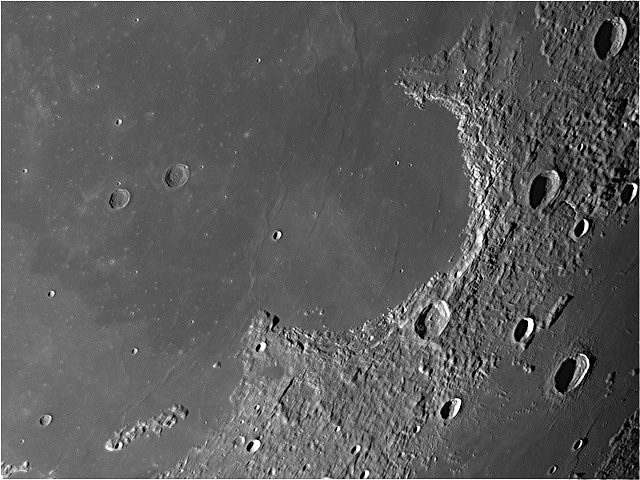
Permanent link to this entry


|
2011
April
15-16
|
The Bay of Rainbows
On the evening of the 14th, the air was too unsteady for me to get good
pictures of Saturn, but somehow, the moon, in a different part of the sky,
came out fine. This is Sinus Iridum (the Bay of Rainbows), a stack of the
best 2000 out of 2840 video frames, taken with an 8-inch telescope, DMK
camera, and IR-pass filter (this is an infrared image).
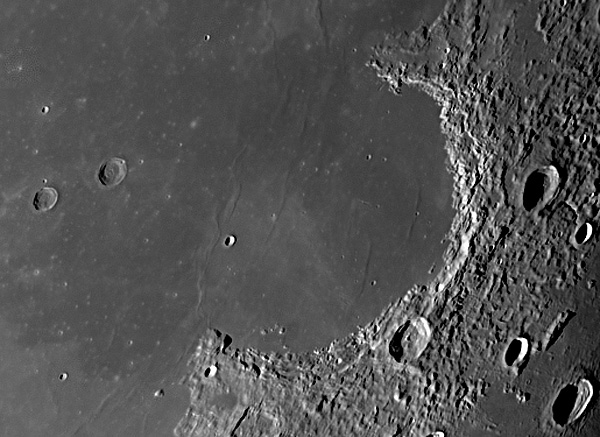
Permanent link to this entry


|
2011
April
13-14
|
An old friend identified
Carolina Geranium (Cranesbill), Geranium carolinianum

When I was five years old, I paid some attention to the weeds that my parents were
removing from the lawn. I was, of course, allowed to pull them up and look at the
root structures. One of the distinctive-looking species that caught my attention was
the one in the picture. It has round leaves, tiny flowers, and, often, reddish stems.
But I never found out what it was called.
Nearly half a century later, I finally got around to tracking it down.
It is a Carolina geranium
or cranesbill. Like most true geraniums, it is weed-like;
many of what gardeners call geraniums are actually Pelargonium species,
which have numerous flowers in groups.
I'm going to grow one in a pot and take a lot of macro pictures of it. What you see here
is a quick iPod photo that I snapped on campus. In Georgia right now, this plant is
extremely common — if you can walk 20 feet without seeing one, somebody
has used a lot of weed killer.
Permanent link to this entry


|
2011
April
11-12
|
How to avoid a tax audit (??)
The media are full of advice on how to avoid having your income
taxes audited.
I'm puzzled. Are they insinuating that I should pay more tax tan
I actually owe, simply to keep down the odds of an audit?
Or what? Maybe I shouldn't have a home-based business, or maybe I shouldn't
give so much to charity?
Nonsense. I've submitted an honest tax return, and I have good records to
back it up. If they want to see those records, they're welcome to.
I'm not going to refrain from taking legitimate deductions or engaging
in legitimate business activities just because it might raise my
odds of being audited.
"Stone walls do not a prison make / Half so secure as rigmarole." — C. S. Lewis.
And yes, I know I said the same thing about a year ago. I didn't remember that
I had even quoted the same poem...
Permanent link to this entry


|
2011
April
8-10
|
Did the government spend 8 times its income in March?
True but misleading? No, just plain FALSE.
Some politicians are telling us that
the
federal government spent more than 8 times its income in March 2011.
Let's see how they arrive at that.
The "8 times" statistic is based
on this
daily cash flow report, which includes totals for March because it is
the last day of the month.
Sure enough, revenue $194 billion minus some amount of tax refunds; outgo $1,118 billion ("Total Withdrawals").
(The amount of tax refunds in the news story does not match what I see in Table IV.)
Now, there's some very misleading interpretation going on here.
As far as I can make out, the cited $1,118 billion of outgo includes $705 billion of debt payments
(Table II, right column) but the cited income does not include $786 billion of new debt (left column).
They're rolling over their debt as bonds expire, and it's totally irresponsible to report
half of this and not the other half.
In short, that's about an $81 billion increase in debt, not a $705 billion shortfall.
Which brings me to something else: March is when the bulk of tax refunds go out.
Those tax refunds took something like $70 billion off the income, for this month only.
Maybe we should look at a month that isn't in the middle of refund season.
Does the government spend too much? Yes. Does it spend 8 times its income? No.
Permanent link to this entry


|
2011
April
5-7
|
Veritas Forum
I'm speaking at this event:

Click here for more.
Permanent link to this entry


|
2011
April
3-4
|
Reinventing Covington Innovations
About two years ago, with no fanfare, Melody retired from doing graphic design work.
This implies a change in the nature of our web site; we no longer want to advertise
services we're not offering. So I'm doing a very minor redesign of
www.covingtoninnovations.com.
My goal this time is to focus on
my consultancy (which is going to expand in the next few years) and move personal
interests and hobbies, including astronomy, onto the "More..." page.
Melody's graphic design portfolio will go there, too.
The site was designed by Melody in 2002, and I really like its overall look.
Here are the three successive versions of our start page. These pictures are
not "live" and you can't click on them.
November 2002:
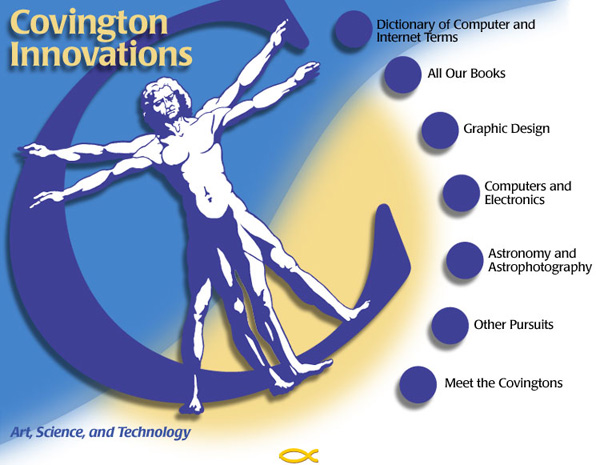
November 2009:
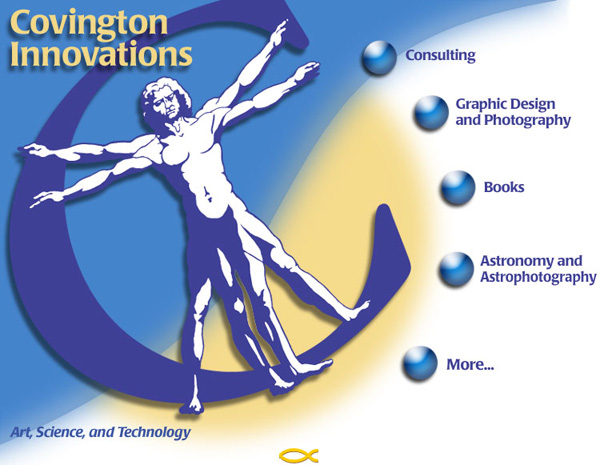
April 2011:
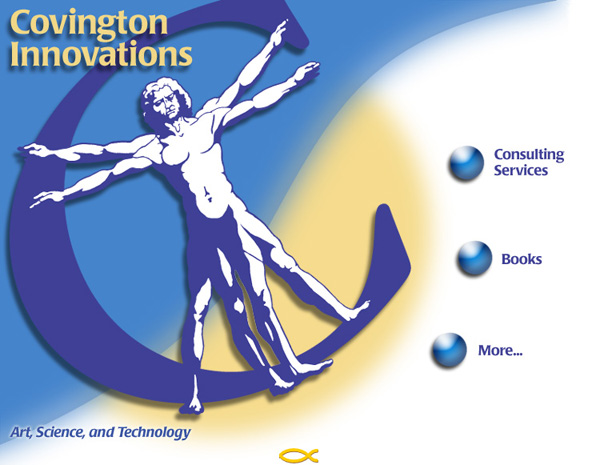
The changes will spread over the site in the next few weeks, appearing first on the
Consulting Services
page. (Be sure to click Refresh in your browser when you go there, so that you see
the latest version of everything.) While I'm propagating the new changes throughout the
site, I'll also clean up a few pages that were not reached by the late-2009 makeover.
I really like Melody's design for the site.
It reminds me of the design used by Zeiss,
and as time goes by, it faces the same organizational challenges.
Of course, we cribbed our trademark from
Leonardo da Vinci.
Permanent link to this entry


|
2011
April
1-2
|
UnxUtils — GNU Utilities for Windows — MSI Installer
A number of years ago, Dr. Karl Syring ported a number of useful UNIX
commands, such as diff and grep, to Windows (Win32).
The package has a SourceForge page
but the project seems dead in the water — Dr. Syring cannot be contacted.
I've been using the software for years, but it's clumsy to install. You have to
choose a place to put it and then edit your environment variables manually so the
new commands will be on the search path.
Yesterday I made an MSI installer that automatically installs UnxUtils and puts it
on the path. Click here to download it.
I would like to contribute this to SourceForge and am inquiring whether there is a
way to do so in the absence of the project administrator.
Permanent link to this entry
Heard on the radio
Traces of radioactivity (and I do mean traces) from the Japanese nuclear reactor incident
have now been found in American milk. Heard on the radio: "Any radiation is too much, so I won't
be buying any more milk."
Pardon me, madam... you do know there is radiation present in nature, don't you?
If the amount in a gallon of milk bothers you, by all means stay away from granite mountains.
29 years: On April 2, 1982, I left Yale University, doctoral degree in hand,
having stayed an extra day to avoid finishing on April Fool's day.
Permanent link to this entry


|
|
|
This is a private web page,
not hosted or sponsored by the University of Georgia.
Copyright 2010 Michael A. Covington.
Caching by search engines is permitted.
To go to the latest entry every day, bookmark
http://www.covingtoninnovations.com/michael/blog/Default.asp
and if you get the previous month, tell your browser to refresh.
Entries are most often uploaded around 0000 UT on the date given, which is the previous
evening in the United States. When I'm busy, entries are generally shorter and are
uploaded as much as a whole day in advance.
Minor corrections are often uploaded the following day. If you see a minor error,
please look again a day later to see if it has been corrected.
In compliance with U.S. FTC guidelines,
I am glad to point out that unless explicitly
indicated, I do not receive payments, free merchandise, or other remuneration
for reviewing or mentioning products on this web site.
I have a Canon EOS 20Da camera and a Tektronix
TDS 210A oscilloscope on long-term loan from their manufacturers. Other reviewed
products are usually things I purchased for my own use, or occasionally items
lent to me briefly by manufacturers and described as such.
|
|
















